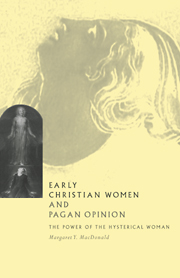Book contents
- Frontmatter
- Contents
- Preface
- List of abbreviations
- Introduction
- PART ONE Pagan reaction to early Christian women in the second century CE
- PART TWO Celibacy, women, and early church responses to public opinion
- PART THREE Marriage, women, and early church responses to public opinion
- General conclusion
- Bibliography
- Index
Introduction
Published online by Cambridge University Press: 15 December 2009
- Frontmatter
- Contents
- Preface
- List of abbreviations
- Introduction
- PART ONE Pagan reaction to early Christian women in the second century CE
- PART TWO Celibacy, women, and early church responses to public opinion
- PART THREE Marriage, women, and early church responses to public opinion
- General conclusion
- Bibliography
- Index
Summary
Defining the task
Among the second-century critics of early Christianity, Celsus was the most prolific. Unfortunately, we possess very little information about his life. His book The True Doctrine, written about 170 CE, no longer exists, and it is known to us only from a rebuttal composed by Origen some seventy years later, Contra Celsum. Luckily Origen quotes Celsus at length, and we are thus in a good position to recover much of what Celsus originally said. Of particular importance for this study is Celsus' remarkable interest in the presence of women among Jesus' followers, and in their role in the development of Christianity. In fact, Celsus describes the Christian resurrection belief as having been created by a ‘hysterical woman’ who was deluded by sorcery:
But we must examine this question whether anyone who really died ever rose again with the same body … But who saw this? A hysterical female, as you say, and perhaps some other one of those who were deluded by the same sorcery, who either dreamt in a certain state of mind and through wishful thinking had a hallucination due to some mistaken notion (an experience which has happened to thousands), or, which is more likely, wanted to impress others by telling this fantastic tale, and so by this cock-and-bull story to provide a chance for other beggars.
- Type
- Chapter
- Information
- Early Christian Women and Pagan OpinionThe Power of the Hysterical Woman, pp. 1 - 48Publisher: Cambridge University PressPrint publication year: 1996
- 9
- Cited by

